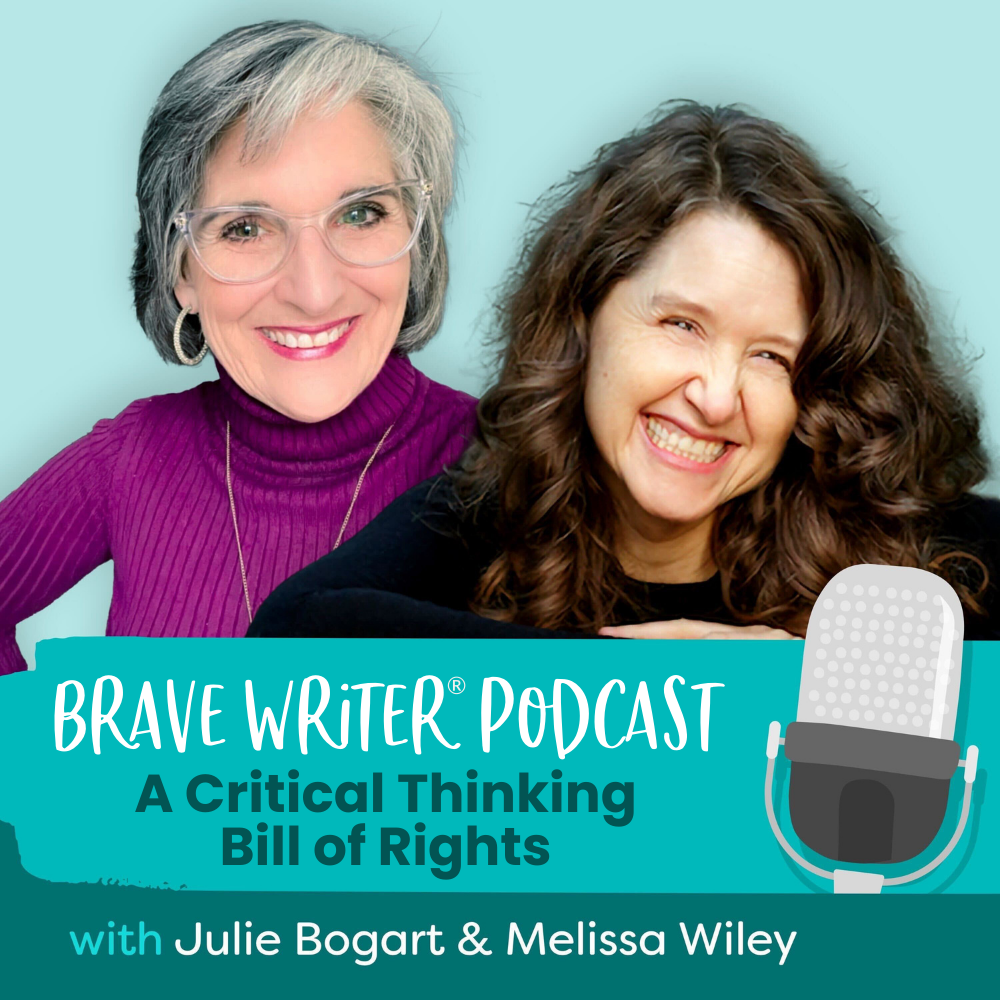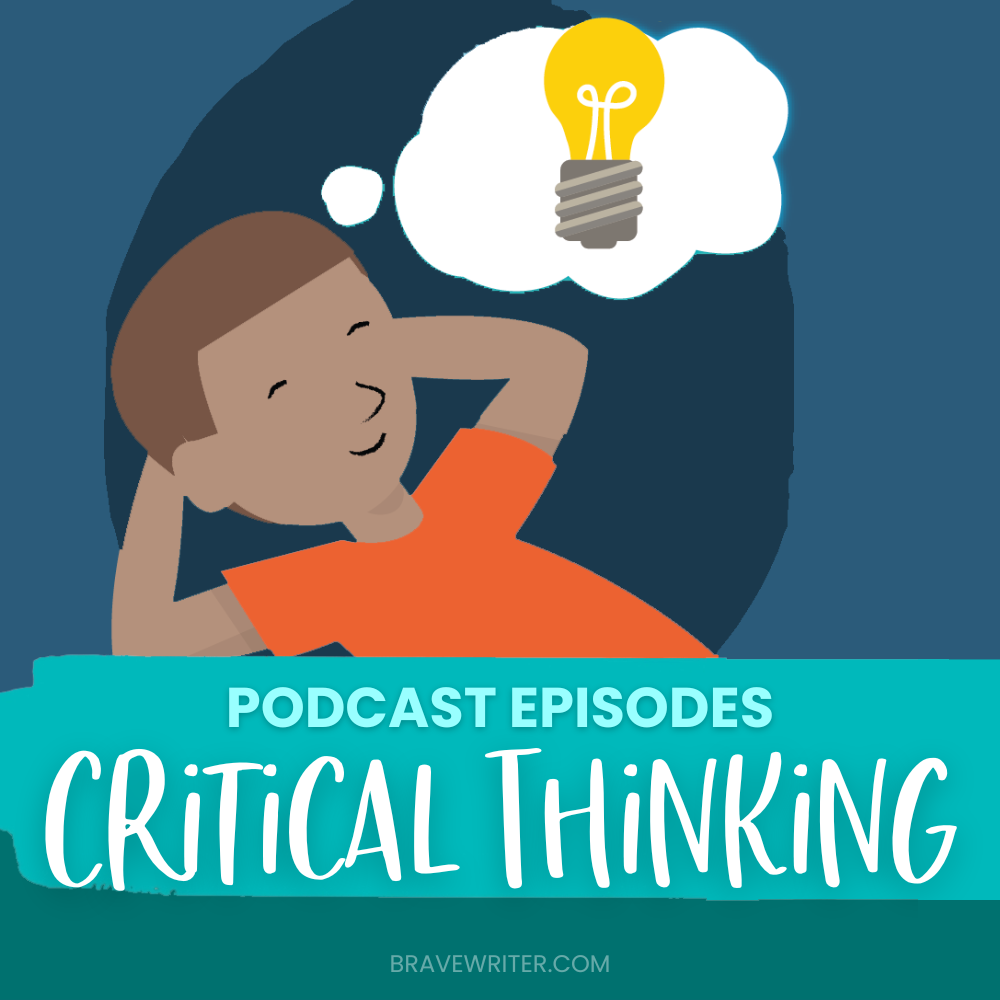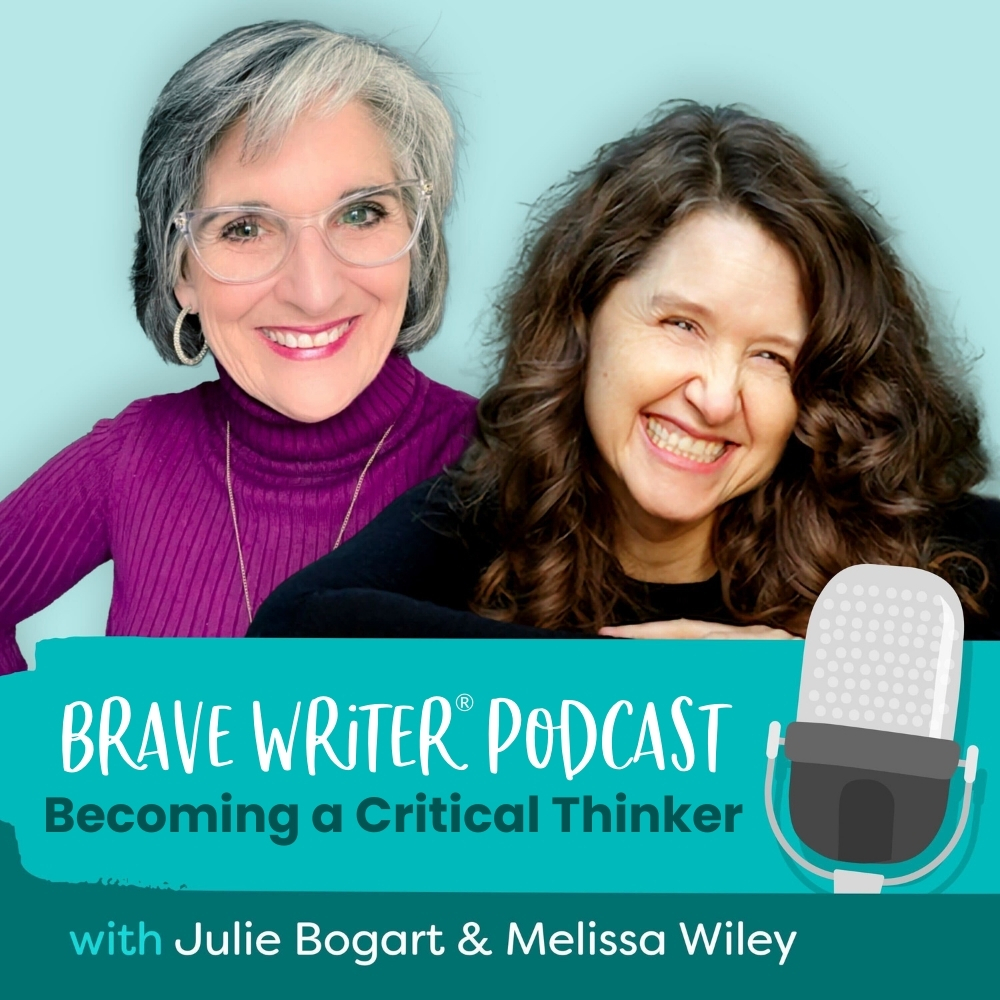
A Reason to Be Brave

Referring to the Brave Writer philosophy, someone asked: “Where did you find the courage to homeschool in such a unique way?”
I loved this question because it helped me understand Brave Writer’s role in the home education space.
My whole goal is to give you a reason to have courage, to be brave.
You can take it in baby steps.
One little step at a time gets you the whole way there.
You develop confidence as you see results.
And the good news is this: your kids will teach you. They don’t tolerate boredom or meaninglessness.
You’ll want to learn how they learn so that you can create the beautiful vision of education that you dare to hope is true and viable.
Need more support? Brave Learner Home is our online community of families homeschooling together the Brave Writer way. We help you discover joy in learning at home and gain the skills you need to teach with confidence.
[Podcast #328] A Critical Thinking Bill of Rights

What do you—and your kids—have the right to think, question, and say?
This week on the Brave Writer podcast, we unpack a “Critical Thinking Bill of Rights” and apply it to homeschooling life. We explore the pull of group identity, the courage to disagree with leadership, the power of private thoughts, and the freedom to change your mind.
We talk about:
- fairness in co-ops,
- resisting performative values,
- and raising kids who can think for themselves without fear.
If you’ve ever felt pressure to conform or questioned whether you’re “doing homeschool right,” this conversation will steady you.
Join us—and then talk through these rights with your kids.
Show Notes
When we chose homeschooling, we stepped away from the status quo. That decision required thoughtfulness and courage. Yet once outside conventional schooling, many of us feel pressure to find a new authority, a new label, or a new group to anchor us. What if instead we anchored ourselves in a set of rights that protect independent thinking? Here is a Critical Thinking Bill of Rights for homeschool families—ten reminders that safeguard intellectual freedom in our homes.
1. You Have the Right to Your Own Thoughts and Viewpoint
You own your mind. Exposure to a book, speaker, curriculum, or philosophy does not require allegiance to it. You can consider ideas without adopting them wholesale. The same is true for your children. When they disagree with you, they are not necessarily being defiant—they are practicing the skill of thinking independently. If we want adults who can reason, evaluate, and discern, we must allow children to try out their own viewpoints safely at home.
2. You Have the Right to Disagree with Leadership
Authority does not erase your discernment. Whether it’s a co-op director, a curriculum author, or a long-standing homeschool philosophy, you are allowed to question and disagree. Respectful dissent is not disloyalty. In fact, learning how to disagree thoughtfully is one of the most important skills we can model for our kids. Homeschooling invites us to participate in education, not passively submit to it.
3. You Have the Right to Private Thoughts
Not every idea needs immediate public expression. Some thoughts require quiet reflection before they are ready to be shared. There is a difference between secrecy born of shame and privacy born of process. Journaling, thinking time, and internal wrestling are healthy parts of intellectual growth. Our children deserve space to think without fear of premature scrutiny.
4. You Have the Right to Not Know
Homeschooling is filled with uncertainty. We try approaches, adjust rhythms, and learn as we go. It is honest—and healthy—to say, “I don’t know yet.” We are not required to predict outcomes before taking a step. Modeling comfort with uncertainty teaches our children that learning is iterative and that wisdom develops over time.
5. You Have the Right to Change Your Mind
Growth often looks like revision. Interests evolve, needs shift, and philosophies mature. A family that once embraced one educational style may pivot to another. A child who loves one subject deeply may lose interest and move on. Changing your mind is not inconsistency—it is responsiveness to new information and lived experience.
6. You Have the Right to Not Be Defined by the Group That Claims You
Labels can help us find community, but they should never flatten our individuality. You are more than a category. Even within a shared philosophy, families express it differently. No group has the authority to dictate the totality of your identity. You get to define your homeschool in ways that reflect your real life.
7. You Have the Right to Speak Up, Even If Your Voice Falters
Not everyone thinks quickly or speaks confidently in the moment. Some need time. Some need space. Still, every person deserves the opportunity to be heard. In our homes, we can cultivate habits of listening patiently and responding respectfully. Encouraging hesitant voices builds confidence and strengthens the culture of dialogue within our families.
8. You Have the Right to Expect Evidence, Proof, and Consistency
You do not have to accept ideas simply because they are popular or passionately delivered. Asking “Why?” and requesting clarification is a sign of engagement, not rebellion. Healthy critical thinking includes evaluating evidence and noticing whether arguments are internally consistent. We can teach our children to weigh ideas thoughtfully rather than accepting them on authority alone.
9. You Have the Right to Hold People Accountable to Their Stated Values
When leaders, communities, or even parents express certain values, it is reasonable to expect those values to be lived out consistently. Accountability does not require hostility. It simply invites alignment between words and actions. Teaching our children to notice this alignment helps them develop integrity in their own lives as well.
10. You Have the Right to Expect Fairness and Courtesy
Disagreement does not justify disrespect. If a conversation shifts into character attacks or dismissiveness, it is no longer productive. Within homeschool communities—and within our own families—we can insist on fairness and kindness as the baseline for dialogue. Critical thinking flourishes best in environments where people feel safe to speak honestly without fear of humiliation.
Homeschooling is not merely an academic choice. It is a daily practice of thinking, revising, questioning, and growing together. When we honor these ten rights in our homes, we raise not performers who conform, but thinkers who engage the world with clarity and courage.
Resources
- Read Julie’s Substack post on her Critical Thinking Bill of Rights
- Find our favorite readalouds and nonfiction in the Brave Writer Book Shop
- Brave Writer class registration is open!
- Visit Julie’s Substack to find her special podcast for kids (and a lot more!)
- Purchase Julie’s new book, Help! My Kid Hates Writing
- Find community at the Brave Learner Home
- Learn more about the Brave Writer Literature & Mechanics programs
- Start a free trial of CTCmath.com to try the math program that’s sure to grab and keep your child’s attention
- Subscribe to Julie’s Substack newsletters, Brave Learning with Julie Bogart and Julie Off Topic, and Melissa’s Catalog of Enthusiasms
- Sign up for our Text Message Pod Ring to get podcast updates and more!
- Send us podcast topic ideas by texting us: +1 (833) 947-3684
- Interested in advertising with us? Reach out to media@bravewriter.com
Connect with Julie
- Instagram: @juliebogartwriter
- Threads: @juliebogartwriter
- Bluesky: @bravewriter.com
- Facebook: facebook.com/bravewriter
Connect with Melissa
- Website: melissawiley.com
- Substack: melissawiley.substack.com
- Instagram: @melissawileybooks
- Bluesky: @melissawiley.bsky.social
Produced by NOVA
What if I Suspect That My Child Is Using AI for Writing Projects?

In our Brave Writer online classes, writing instructors not only give feedback about your child’s writing, they also highlight particular pain points in home education.
Every so often, we’ll share their comments on the blog (with persmission) so the wider homeschool community can benefit. Plus, this will give you a sneak peek of the kind of thoughtful input our writing coaches provide!
In today’s post, a parent had asked what to do if a child is suspected of using Chat GPT for a rough draft. Coach Hanne Bjornstad replies.
The Response
Thanks for reaching out. You’re not alone with this; I’m coming across more and more families who are trying (struggling!) to navigate these new technologies. I think about this a lot for my own kids, too. I used to think we’d be immune to its charms, but I’m seeing now that this is going to be something we all have to think about. Phew, right? …
While I can give you some ideas for spotting AI, I know that’s not really getting to the heart of your dilemma, which comes down to something that feels a lot more relational. We want our kids to know that we value their essential “them-ness,” right? And we don’t want to shake that relational connection with suspicion, especially because we know how capable and thoughtful they are. I think you’re right that the goal in all of this is to be able to hear a writer’s own distinctive voice, and I wonder if there’s a way to focus on that in a conversation with him.
I also wonder if externalizing things a bit might help. There are free AI checkers that you can run text through, like GPTZero, and they say something like: “This software says there might be some AI text in your draft.” That might feel less like a direct accusation. When I’ve had some suspicions with my own kid, I also have asked her just to walk me through her writing process and how she came up with the ideas because “they seem a little different from your usual writing.”
I don’t know if that helps or not; I’m happy to keep chatting. I’ve been thinking about AI in writing a lot lately, in case you can’t tell by the length of this reply! On my end, I’ll continue to treat his writing as unique and original to him, as that’s our current policy at Brave Writer, but if you want him to submit another draft or take another approach, just let me know, and we can work something out!
Warmly, Hanne
Critical Thinking Podcast Episodes

We’ve talked a lot about critical thinking on the Brave Writer podcast! Here are some past episodes you don’t want to miss.
- Becoming a Critical Thinker
- Critically Thinking about the News with Mosheh Oinounou Pt. 1
- Critically Thinking about the News with Mosheh Oinounou Pt. 2
- Critical Thinking for Toddlers with Susie Allison of Busy Toddler
- How Enneagram Types Think Critically with Leslie Hershberger
- Thinking Critically, Aging Gracefully & Being a True Influencer with Lyn Slater, Accidental Icon
Raising Critical Thinkers is circling the globe via podcast and news article! If you’re interested in hearing a wide array of thoughts that I’ve shared about the contents of my book, check out some of these delightful interviews.
[Podcast #327] Becoming a Critical Thinker

What does it really mean to think critically in a world that never stops shouting at us?
In this Brave Writer podcast episode, we slow things down and explore how to stay grounded when information, emotion, and opinion collide.
We talk about:
- noticing our own reactions,
- asking better questions,
- and learning how to separate facts from the stories wrapped around them.
Along the way, we share practical tools you can use with your kids—and yourself—to build clarity, curiosity, and courage. If you’ve ever felt overwhelmed by the noise or unsure how to model thoughtful engagement, this conversation offers a steady place to begin. Join us, and keep thinking well.
Show Notes
We live in an age of information overload. News arrives faster than we can process it, opinions stack on top of opinions, and emotional reactions often outrun thoughtful reflection. It’s no wonder so many parents feel unsure about how to help their kids make sense of it all. Critical thinking, though often treated as an academic skill, begins much closer to home—in our own habits of mind.
One of the most important shifts we can make is recognizing that critical thinking doesn’t start with evaluating someone else’s argument. It starts with noticing ourselves. Before reading an article, opening an email, or responding to a post, we can ask a deceptively simple question: What do I hope will be true? That single moment of awareness reveals how much emotion, identity, and desire shape the way we receive information.
Right-Sizing Our Reactions
Not every piece of information deserves the same level of alarm or passion. Learning to match our emotional response to the actual stakes of a situation is a core critical thinking skill. Overreacting to minor issues leaves us exhausted. Underreacting to serious ones can be dangerous. When kids see us calmly assess what matters—and why—they learn that thinking isn’t about panic or dismissal. It’s about proportion.
Turning the Lens Inward
An “academic selfie” invites us to examine assumptions we’ve stopped questioning. Why do we label some schools as “good” and others as “bad”? Why do we accept uneven teaching quality in institutions that promise excellence? When we turn the lens inward, we model humility and curiosity. We show kids that growth begins by examining what we take for granted.
Facts, Stories, and the Space Between
Facts never arrive alone. They’re always embedded in stories shaped by word choice, order, and tone. Separating verifiable details from narrative framing helps remove some of the emotional charge. Dates, names, actions, locations, and data give us something solid to hold onto when everything else feels slippery.
At home, this can look like reading two articles on the same topic—without knowing the source—and noticing what feels persuasive, irritating, or comforting. Those reactions are data too.
Curiosity Over Combat
When disagreements arise, curiosity opens doors that confrontation slams shut. Asking someone how their view makes the world better invites explanation rather than defensiveness. It also gives us insight into values, fears, and priorities we might otherwise miss. That same posture helps our kids feel safe bringing us questions that don’t yet have neat answers.
Critical thinking isn’t about winning arguments or proving ourselves right. It’s about developing the courage to look honestly at information, beliefs, and emotions—our own included. When we create homes where curiosity is welcomed and thinking is allowed to evolve, we give our children something far more lasting than answers. We give them the tools to think well.
Resources
- Find Raising Critical Thinkers and Becoming a Critical Thinker on Julie’s website at juliebogartwriter.com
- Brave Writer class registration is open!
- Visit Julie’s Substack to find her special podcast for kids (and a lot more!)
- Purchase Julie’s new book, Help! My Kid Hates Writing
- Find community at the Brave Learner Home
- Learn more about the Brave Writer Literature & Mechanics programs
- Start a free trial of CTCmath.com to try the math program that’s sure to grab and keep your child’s attention
- Subscribe to Julie’s Substack newsletters, Brave Learning with Julie Bogart and Julie Off Topic, and Melissa’s Catalog of Enthusiasms
- Sign up for our Text Message Pod Ring to get podcast updates and more!
- Send us podcast topic ideas by texting us: +1 (833) 947-3684
- Interested in advertising with us? Reach out to media@bravewriter.com
Connect with Julie
- Instagram: @juliebogartwriter
- Threads: @juliebogartwriter
- Bluesky: @bravewriter.com
- Facebook: facebook.com/bravewriter
Connect with Melissa
- Website: melissawiley.com
- Substack: melissawiley.substack.com
- Instagram: @melissawileybooks
- Bluesky: @melissawiley.bsky.social
Produced by NOVA





















